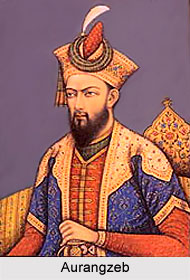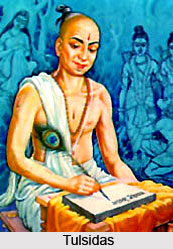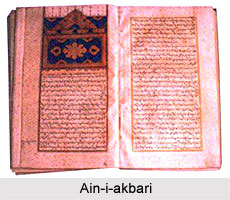 Persian and Vernacular literatures developed during this period. Evolution of Urdu language was witnessed during this period. The kings extended their patronage profusely to this activity. During the Mughal period Urdu developed more in the Deccan than in Hindustan where its development began only in the reign of Aurangzeb. The social content of the literature was inadequate. Themes are often taken from outside India. Such a literature was a necessary outcome of the medieval feudalism and aristocratic life. The contribution of the Mohammedans in the evolution of historical writing and prose-narration cannot be exaggerated.
Persian and Vernacular literatures developed during this period. Evolution of Urdu language was witnessed during this period. The kings extended their patronage profusely to this activity. During the Mughal period Urdu developed more in the Deccan than in Hindustan where its development began only in the reign of Aurangzeb. The social content of the literature was inadequate. Themes are often taken from outside India. Such a literature was a necessary outcome of the medieval feudalism and aristocratic life. The contribution of the Mohammedans in the evolution of historical writing and prose-narration cannot be exaggerated.
A reformed system of education took place in the Mughal times. Primary school curriculum comprised learning of sections of Holy Quran, the practice of reading and writing the alphabet and other lessons on wooden boards. In the secondary institutions art of administration, arithmetic, algebra, sciences, accounts, economics, history, law, morals, literature and philosophy were taught. The aim of education was to bring out the latent faculties of the students, to inculcate discipline, to mould character, prepare for life and equip them for the professions. Religion was at the root of all studies. Teachers were held in high esteem. Universities were the residential type. Monitorial system was in vogue, education was free and scholarships were granted. There were Hindu institutions also corresponding to these rules.
 Literature in the Mughal period developed due to Akbar`s reign. It may be classified under the heads of translations, histories, letters and verse. Translations were made from Sanskrit books. The famous historical works of the period are Ta`rikh-i-Alfi of Mulla Daud, the Ain-i-Akbari and Akbarnamah of Abul Fazl, the Muntakhab-ut-Tawarikh af Badauni, the Tabaqat-i-Akbari of Nizam-ud-din Ahmad, the Akbarnamah of Faizi Sar-hindi, and the Ma`asir-i-Rohini of Abdul Baqi. The most accomplished writer was Abul Fazl. He was a poet, an essayist, a critic and a historian. His Ain-i-Akbari is famous. It is an encyclopaedia where useful information of all kinds is found and to which people in every walk of life could resort for reference, instruction and amusement.
Literature in the Mughal period developed due to Akbar`s reign. It may be classified under the heads of translations, histories, letters and verse. Translations were made from Sanskrit books. The famous historical works of the period are Ta`rikh-i-Alfi of Mulla Daud, the Ain-i-Akbari and Akbarnamah of Abul Fazl, the Muntakhab-ut-Tawarikh af Badauni, the Tabaqat-i-Akbari of Nizam-ud-din Ahmad, the Akbarnamah of Faizi Sar-hindi, and the Ma`asir-i-Rohini of Abdul Baqi. The most accomplished writer was Abul Fazl. He was a poet, an essayist, a critic and a historian. His Ain-i-Akbari is famous. It is an encyclopaedia where useful information of all kinds is found and to which people in every walk of life could resort for reference, instruction and amusement.
Poetry reached the pinnacle of glory under the Mughal Empire. Babur and Humayun were poets and this tradition was continued by Akbar. Abul Fazl, Abdur Rahim, Abdul Fateh, Ghizali, Mohammad Husain Naziri and Sayyid Jamaluddin Urfi of Shiraj were the poets of that period.
 Jahangir possessed an excellent literary taste. His autobiography is second only to that of Babur as far as content and style is concerned. His court was adorned by literary gems like Ghiyas Beg, Naqib Khan, Mutamid Khan, Niamatullah and Abdul Haqq Dihlawi. Some historical works like the Ma`asir-i-Jahangiri , Padshah-namah by Abdul Hamid Lahori, Shah-jahannamah by Inayat Khan and Amal-i-Salih by Muhammad Salih Shah. were composed during this period. Among the historical works mention may be made of Jahan was also a patron of art and literature. Two distinct schools of writers had come into existence during this period, the Indo-Persian school and the purely Persian school. Abul Fazl was an outstanding representative of the Indo Persian School. Abdul Hamid Lahauri, Md. Waris, Chandra Bhan and Md. Salih were the representatives of this school. This school absorbed Indian ideas and thoughts. The poets wrote `ghazals` `Qasida` `masnavi` and poems of adulation. Gilani, Kalim, Qudsi, Rafi, Munir, Haziq, Khiyali and Mahir were the other great poets. There were prose writings of other types for instance dictionaries, medicinal and religious books, astronomy, mathematics and translations from Sanskrit.
Jahangir possessed an excellent literary taste. His autobiography is second only to that of Babur as far as content and style is concerned. His court was adorned by literary gems like Ghiyas Beg, Naqib Khan, Mutamid Khan, Niamatullah and Abdul Haqq Dihlawi. Some historical works like the Ma`asir-i-Jahangiri , Padshah-namah by Abdul Hamid Lahori, Shah-jahannamah by Inayat Khan and Amal-i-Salih by Muhammad Salih Shah. were composed during this period. Among the historical works mention may be made of Jahan was also a patron of art and literature. Two distinct schools of writers had come into existence during this period, the Indo-Persian school and the purely Persian school. Abul Fazl was an outstanding representative of the Indo Persian School. Abdul Hamid Lahauri, Md. Waris, Chandra Bhan and Md. Salih were the representatives of this school. This school absorbed Indian ideas and thoughts. The poets wrote `ghazals` `Qasida` `masnavi` and poems of adulation. Gilani, Kalim, Qudsi, Rafi, Munir, Haziq, Khiyali and Mahir were the other great poets. There were prose writings of other types for instance dictionaries, medicinal and religious books, astronomy, mathematics and translations from Sanskrit.
Aurangzeb had no taste for poetry or prose. Historical works were written in secrecy during his rule. Among the famous works during his period were Alamgirnamah by Mirza Muhammad Kazim, Muntakhab-ul-Lubab of Khafi Khan, Khulasat-ut-Tawa-rikh of Sujan Rai Khatri and Fatuhat-i-Alamgiri of Ishwar Das.
Provincial languages witnessed a great development during this period. This age may be called the classical age of Hindustani literature. Hindi owed its greatest development to a number of saints and poets. During this period there great writers like Tulsidas, Kabir, Surdas, Sundar Das, Chintamani, Kavindra Acharya, Keshava Das, Matiram, Bhushan, Bihari, Deva, Padmakar, Alam, Ghananand and others. Religion, heroism, human love and praise of the king were some of the themes touched by these writers. In Bengal there was a great development of the Vaishnava literature and there were many writers like Krishnadas, Jayanand, Trilochan Das and Mukandaram.






































